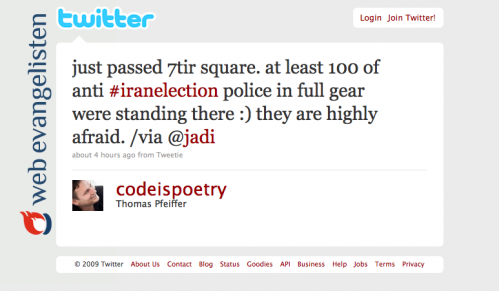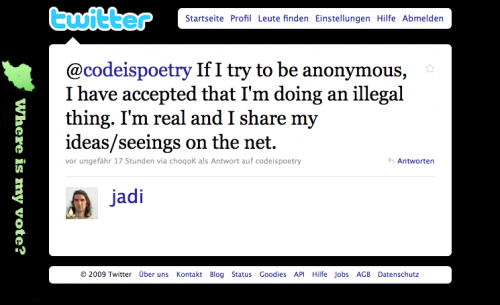How to retweet from #Iranelection
This post exceptionally is written in english to integrate people from Iran and everywhere in the discussion.
This morning I retweetet an Iranian twitterer called @jadi who twittered: “just passed 7tir square. at least 100 of anti #iranelection police in full gear were standing there :) they are highly afraid. /via @jadi“

For that retweet I was @replied, not to mention the Iranian account, as that would be “dangerous”: “@codeispoetry last time we were told pls not to @-attribute when retweeting iran stuff, dangerous ;(“
I don’t believe that mentioning the original account might be dangerous to them!
While it’s uncontradicted, that spreading a news (from the Iranian opposition) is helpful, @mentioning the Iranian author might be bad and dangerous, as assumed. But why? There is no reason! The iranian secret service is monitoring the Iranian twitterati at the point of the internet access providers (How Iran monitors Twitter users / Wie der Iran Twitteruser überwacht). So they know even *before* the message is twittered, who the author is, his or her telephone number, the bank account an so on.
What do we do while retweeting?
We don’t just spread the news. We show the people in Iran, especially every single twitterer, via their @mention-section, that we are watching them, that we take care about their fate and what’s going on there. We give them, every single twitterer retweeted, support. We tell them, that we don’t forget them. That might be not much, but it’s a small sign of engagement.
I think, on the contrary, that not @mentioning the Iranian twitterers cuts them from foreign support. This misinformation might be launched by the Iranian government to counteract the effort to inform about what is going on in Iran. Thinking, that not being read (or retweetet) by anyone else discourages the Iranian people to use Twitter for informing other Iranians and the world about their fate.
The cubanian oppositional blogger Yoani Sánchez for example benefits very much from her worldwide popularity. Rather, hiding the Iranian author from a worldwide audience by not mentioning him or her, means not protecting him or her, but helping the Iranian government instead.
Benefiting from a global audience
The danger is, to hush the Iranian twitters up. @mentioning them, and with that, to bring them (and their voice) audience and followers, helps them!
Update: @jadi’s comment on this discussion via Twitter: If I try to be anonymous, I have accepted that I’m doing an illegal thing. I’m real and I share my ideas/seeings on the net.







(@oliverg)
Hi,
I read on that stuff today a little and it seems that the opposition tends to block suspicious followers or to have blocked accounts. If they think that helps then it also seems that giving away as little info as possible is good.
At first I was aslso irritated at #irabelection ifos that were retweets without sources, then I leaned that this was on request of the dissidents.
If a person is well known in the country or already imprisoned public referenece might have positive effects.
So I’d rather NOT turn attention towards people who are still free and tweeting. Their “business” is hard enough already and our support is seen via the hastags.
(Antworten)